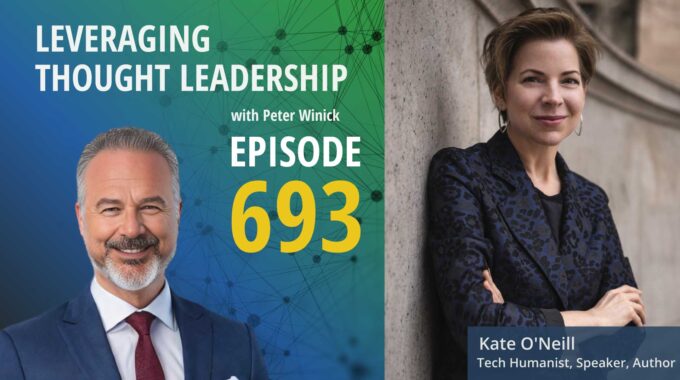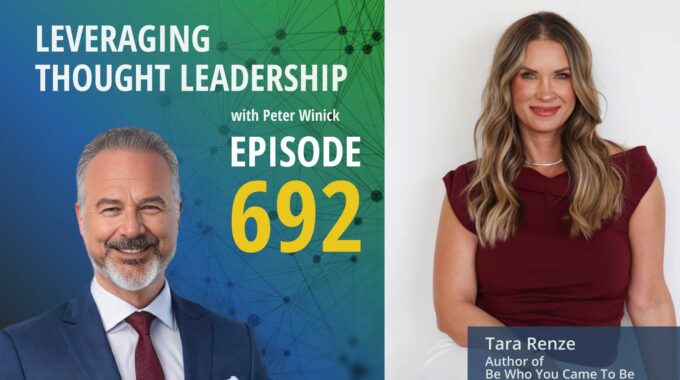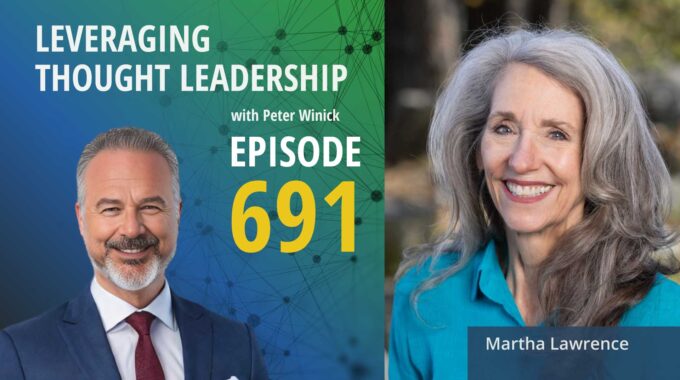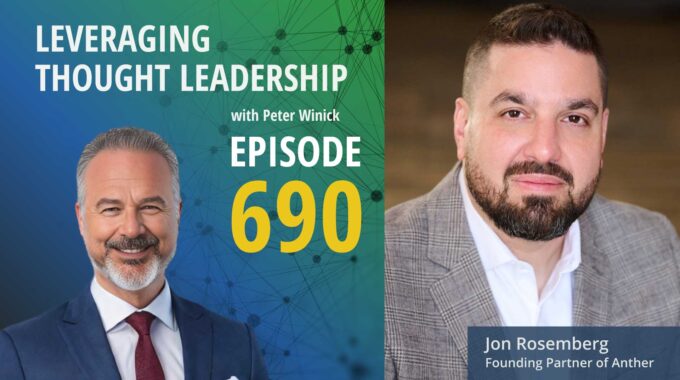Why speed without trust creates risk—and how executives fix it This episode focuses on how…
Propagating Thought Leadership | Rhett Power
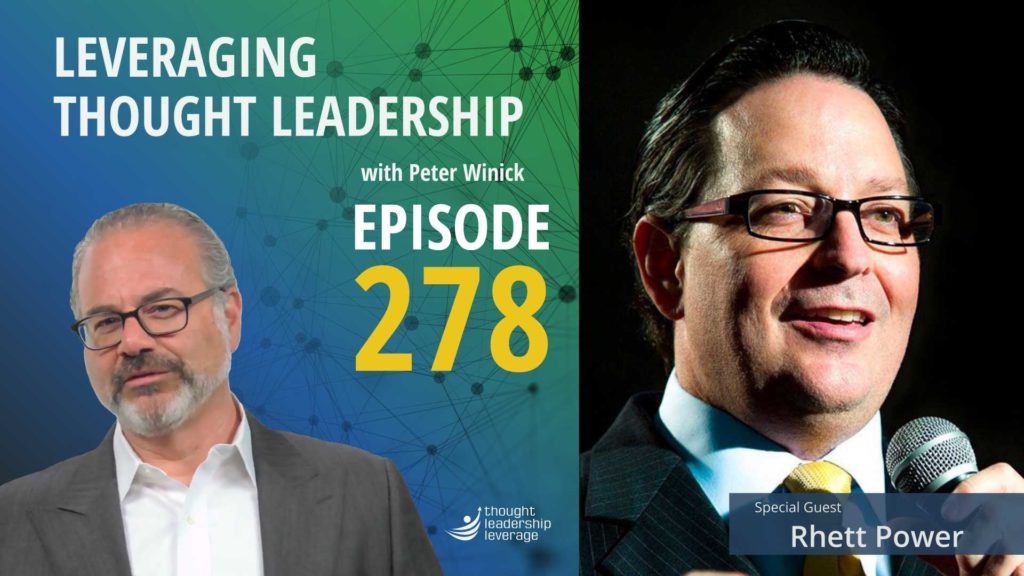
Turning live interviews into content for multiple streams.
An interview with Rhett Power about using LinkedIn live, creating relationships, and pushing beyond your comfort zone.
Today’s guest is Rhett Power. In 2007 he co-founded Wild Creations which became one of Inc. Magazines 500 Fastest-Growing US companies. Currently, he is a co-founder of Courageous Leadership, a consultancy that brings an amalgamation of experienced behavior scientists, entrepreneurs, and best-selling authors together. He is the best-selling author of The Entrepreneur’s Book of Actions and One Million Frogs.
Rhett discusses how the need to follow his gut led him from position to position while avoiding becoming complacent. As he became better known, he avoided becoming over-committed.
Rhett has a strong background as a writer, starting with Inc. Magazine. In addition, he shares how working for them allowed him to use their brand recognition to open doors. These open doors allowed him to meet people he previously might not have received access to.
Also, Rhett hosts Linkedin Live interviews and he details how he able to build two and three other pieces of content out of each interview. And then he explains how he is building relationships that help share his content, introduces new people, and even creates clients!
Three Key Takeaways from the Interview:
- Thought leaders need to trust their gut and move to new challenges when it tells them to.
- Live interviews via podcast or Linkedin live can be turned into multiple pieces of written short form Thought Leadership after the fact.
- Building a following for your thought leadership is a multi-year commitment. You have to have a work ethic around it and be persistent.
If you would like help strategizing your next steps in thought leadership, contact Thought Leadership Leverage. We can assist you with everything from book launch strategies, research, marketing, branding, sales, and more.
Transcript
Peter Winick And welcome, welcome, welcome. This is Peter Winick. I’m the founder and CEO of Thought Leadership Leverage. And you’re joining us on the podcast today, which is leveraging thought leadership. Today, my guest is Rhett Power. Given we only have 20 minutes, I’m not going to give you his entire bio and give you the highlight. So Rick co-founded Wild Creations in 2007 and built the startup company into the 2010 fastest growing business in South Carolina. He’s the co-founder at Courageous Leadership, which is a cool leadership consultancy that helps you believe again. It’s an amalgamation of experienced behavioral scientist, entrepreneurs, bestselling authors and breakthrough story makers who worked with and helped grow some of the largest, most relevant brands on the planet, such as Google, Snapchat, Major League Baseball, etc.. He’s got obviously several books. We’ve been on CNN, Huffington Post and I happy he has lower standards to join me today. So thank you for joining me.
Rhett Power Thanks, Peter. So high standards. How about that?
Peter Winick Well, there you go. Thank you. So how does one go from like, if I look at some of the highlights here? Consultancy, Toy Company speaker, CNN. Clearly, there’s a logical way to connect all those dots. But I’m going to need you to give me the decoding that you have to have to get this.
Rhett Power There really is no decoder ring on this. There is no logic whatsoever to it. I have the worst case of A.D.D. in the world. And so I had. Which is which is good for being creative, but get that getting in place for too long. No, no, look, I. Everything I’ve done, everything I’ve done before I did. Whatever I’m doing now.
Peter Winick Sort of led.
Rhett Power Me here. I think, you know, I went from working at Clear Channel Communications in the Sierra Club to the war and then the Peace Corps to USAID and USAID, to the toy company in the toy company to being a coach and a business and leadership consultant. And all of those were really important to where I am today for for multiple reasons. You know, when I started the toy company, what I did at USAID and after Peace Corps was we helped former Soviet companies transform from a Soviet based economy, a command economy, to a market economy. So we spent seven years working with small businesses, medium sized businesses, larger companies, factories, understanding the market and how to learn how to manufacture based on the market need, not what was being told to them by the government. So helping transform companies. And so finally we decided, you know what? You know, I’ve always, always been a follower of my gut, too. And I, I listen to what my gut says. And after I did that for about 7 or 8 years, something said, hey, it’s time for you to do something on your own that you need. This is something in you that you need to fulfill to see if you can do this with a company of your own. And so a friend of mine working with me in a management consulting side in I quit and found a company and one product company in South Carolina. I will tell you, all the other companies we looked at, we looked at a dead body removal company that had applied a $5 million EBA to have it patents on body bag, Great business, couldn’t get excited about it. But this little toy company we could really get excited about. And so we went about the massive task of of making that just not a one product company, but an 80 product company, global selling in 35 countries, manufacturing in China and a private label manufacturer for four big brands. So, you know, that was a challenge that we took on and it was something in us that we wanted to fulfill. And when it was time to sell that, the guy once again said, Look, you’ve done what you could do here. It’s time to do something else. I realized in Peace Corps, I love to teach. And I had some good mentors in Mark Thompson and Marshall Goldsmith.
Peter Winick Sure are.
Rhett Power Saying, hey, you should be a coach. And there you go. And they were right up.
Peter Winick Right. And so I want to unpack a couple of things you said there, because there’s a lot there. So, number one, other than sort of the academics that are in the thought leadership space, really is No. One path, right? There just isn’t. So academics have to do certain things and publish and become whatever MBA and thought leadership. There is no this is the best school to go to football leadership. So, you know, you joked about the you know, I would argue, myself included, probably 80% of the folks we work with have some level of A.D.D. And I think it’s not that it is good or bad, it just is. And I think it manifest more in creatives. I think that the magic trick is, you know, having a team to be. Right, Because there’s crazy TV where, I mean, you literally can’t sit with someone for 20 minutes and have a cup of coffee and finish a conversation and it’s like ricochet rabbit all over the place. But then I think there’s others that have, you know, it’s that gut and the intuition and the wisdom to go have done what I can do here and move on. And then there’s also the back burner going. And I’m bored. I’m going, I’m bored and I’m bored and I’m bored. Right. Like the body bag business or the body removal company may have been a wiser decision knows, right. But like you said, who like, I can get excited about removing dead bodies. And if you could, I would be disturbed if you said, Yeah, I really be that this is my purpose, this is my why is getting the get it beating the flies to the flesh or something like that for them. Yeah. Couldn’t get you know. How do you know. Is there times where you’re going on both ends. Like I’m not sure my intuition is really there or I’m just bored or I got to. There’s 23 other things I’d like to play with. How do you thread that needle? Because you’ve on it well.
Rhett Power I have to corral that. You know, I’m a kid in a candy store and a lot of people and, you know, that’s the interesting thing is, is that, you know, the more successful you get in, the more visible you become within it, the more opportunities and more things that get thrown at you.
Peter Winick Yep.
Rhett Power And so, I mean, it’s a fantastic question. When I master that, I will let you know and I’ll come back on the show and tell you how I do it. I for me, I, I get to sort of a and I’ve been in this position several times in my life where I’m overcommitted and I’m sure a lot of different things. And then you just have to sort of stop. And I mean, I did this with the business several times. If I’m actually in a process and, you know, in the last few months doing the same thing again, and that’s just stopping everything you’re doing, assessing what is priority. Okay. That’s an.
Peter Winick Overcommitment. It’s typically self-inflicted. Right. Again, it’s the curse. There’s so many things I’d love to do and could do. And you, my interesting friend, suggested I do this. That sounds like fun. And I know. Shake my head. Yes. Then I look at my calendar go, shoot. Like, how did I get here? You know, I want to pivot for a moment to sort of the business side of the house. So you’ve got the consultancy. You write, you speak. What are the how did you find your way to the business model that you’re in today and land there in a way that you’re comfortable with and you’re happy with it? I’m sure it’s always evolving and all that, but what were you sort of maybe some trial and error and what, what the business models are that work for you?
Rhett Power I resolved after leaving government and leaving the management consulting and with a toy company that I wasn’t I was going to do things that I really enjoyed and that were good for me and my soul. So that’s sort of the criteria I use right now for everything I’m doing. I love the writing part, the writing parts, cathartic for me. You know, I started doing live interviews on LinkedIn about a year and a half ago. Yeah. And I’ve. I just love it. I love, like you do, having smart conversations, learning from people who are doing it, who have done it and who’ve been successful and who are sharing that knowledge with others. And those conversations are fascinating people who are at the top of their field. And so how I fell into I, I started writing for Inc when we were an eight 500 company. I learned and learned how to start. I guess I’ve started learning how to write those types of articles and I’ve just kind of grown that. I realized at some point a few years ago that that was a great way to, you know, when you talk about thought leadership and Leveraging Thought Leadership, there’s a great entrance into conversations I would not normally have. You know, when you call from Inc and you want to do an interview with someone, they’re more than willing. Same with friends. You know, when I call and I say, Hey, I’m doing article for Forbes on this topic, you know, would you mind speaking to me for a few minutes? The always the answer is yes. And so it’s a way to have conversation, conversations I would not have normally have. It’s I you know, I get clients because of it. It’s I’ve seen increases in the price for consulting and coaching because of it and so you know that in. First article in this column really showed me the power of developing your thought leadership and having those platforms. And so now it’s very intentional.
Peter Winick So let’s play with that. So working for Ink or Forbes or whatever, you know, there’s a mutual tradeoff. You’re going to do the lion’s share of the work, right? And they get the content and it’s their brand and it gives you entree to places that you wouldn’t have. I mean, there’s plenty of places to be called and said, hey, I’m right now I’d like to talk to you. They might or might not take the call. Ink probably multiplies that by a factor of something like something significant. But on your on your LinkedIn live, that’s a totally different format, right? So conversations are much more organic or at least we hope they are right and much more informal, although you could learn just as much. So I find and I think this is where you’re going to for me, what are the reason I do the podcast is quite selfish. It’s like I love talking to smart and interesting people. I do it all the time. I might as well hit record and share it with others because it’s an easy way for me to put stuff out there. I was blogging for years. I don’t think I’m a particularly good writer. I barely average maybe, but I did it because it needed to be done and it was a good way to get the message out there. I enjoy this far more, so I sort of switch my efforts more in here. Have you found you put more effort into LinkedIn live versus writing, or how does that work for you?
Rhett Power Well, I’m like you. I’m a I’m an average writer. And what I found with LinkedIn Live is I can cheat a little bit is when you hit that record button. What happens is you have a 30 or 40 minute conversation that I can then transcribe and read an article. So written content out.
Peter Winick Exactly.
Rhett Power And then I can create some reporting. I can create a podcast out of the same thing. And so all of a sudden I’ve got three forms of content that I had just from one recorded interview, like we’re doing the day, right?
Peter Winick And 1,000% good because most people have never thought about content development through the lens of efficiency. We spend our days in business trying to Six Sigma and you know, I’m sure when you’re in the toy business, how do I get the most out of every input and blah blah, blah? Yeah, with our own time, we’re pretty slopping. I’m going to spend an hour writing a blog. I’m going to spend this. And the ability to extrapolate from one piece of content, multiple modalities and formats is really, you know, the ultimate way to do things efficiently and effectively as it relates to thought leadership.
Rhett Power I mean, and even today, I mean, I didn’t most consider it a fourth form of it, which is, you know, cutting up the, you know, this 20 minute interview. You know, you now you can cut it up into four different little interviews, right? You can get another 3 or 4 different pieces and nuggets of short content, which is the way people consume stuff now. So yeah, it’s got some similar uses.
Peter Winick If you’re enjoying this episode of Leveraging Thought Leadership, please make sure to subscribe. If you’d like to help spread the word about our podcasts, please leave us a review and share it with your friends. We’re available on Apple Podcasts and on all major listening apps as well as at Thought Leadership Leverage.com/podcasts. Got it. And you mentioned earlier, hey, it’s good for the brand, right? So that’s good, right? So, you know, why do people do what they do as it relates to thought leadership? One is from a brand standpoint, to differentiate, to show the world that you have something different, unique, etc., to say that others might not or you have a different approach. And it doesn’t. It’s not about pleasing everyone and showing everyone who you are and what you’re about. And by the way, if you don’t agree with that, that’s fine too. Right? The other piece is closer to the marketing and sales side is the net new client acquisition side. Have you noticed sort of the waves of that? Like in the beginning it’s more brand and now people come to you and say, Hey, I’ve read, watch that. I’ve invested three hours in sort of world. I get who you are, Let’s have a conversation. And not that they’re throwing money at you per se, but they’re much closer to the tail end of the buy cycle than they might have been before this. Is that is that resonate?
Rhett Power Yeah. And honestly, it took years. There are periods where I’m like, Why am I doing all this if it’s not resulting in more dollars and more and less cost of client acquisition, really time and money. And it really only in the last year and a half, two years where I think I’ve just got such a volume of content and the higher number of followers and that kind of stuff, you know, it took years to build all that, to consciously build all that, you know, intentionally build all of that. And really only now, I mean, probably 5 or 6 years into that as it really started to pay off. And in the sense that, yeah, I’m not arguing over fees and rates and I’m getting quality and I’m getting quality referrals.
Peter Winick I mean, there’s an expectation that someone doing the things that you’re doing is going to be charging commensurate with something when in those type of public. I call it sort of the compound interest of content, right. Where, you know, when you start I’m an impatient person as well. And I knew when I started, for example, the blog, a friend of mine that had multiple successful blogs at the time, if I didn’t start, I went to him to give me some tips and he said, You’re impatient. I know you like to measure and monitor everything. I said, I know. No, neither of those are tips. There’s a quirk, your attributes. He goes, But before you start making any decisions, don’t commit to one commit to 100 blogs. And I was like, interesting. Because I’m impatient and I like to measure things. When I did the podcast, I said, All right, I’ll commit to 50. It’s a lot of work, right? And then, you know, ultimately magic happens. But it is really frustrating. In the beginning we’re like, Yeah, yeah, that was good. I really worked hard. I’m really proud of that. Like three people saw it and two of them are your neighbors, you know, and you know, they’re not buyers. You don’t even know if they like you. So but, but I think you’re right that you have to be determined to do it. And then ultimately, people that are sniffing you out see that you have this massive body of work and you didn’t just you’re not a fly by night. You’ve been thinking about this deeply for a long time right now.
Rhett Power I mean, I love the way you put that. I mean, it just it is just takes time. And you got to have the patience and you got to have that. It’s almost a you have a work ethic around it, right? In a consistent consistently. Yeah. That it takes a long time to build that up and to get that library and that because people do check you out right and they do look at your body of work and it does pay off, but it’s just it takes a while.
Peter Winick And that consistency piece is interesting because what many people do is there’s an inverse relationship between how busy they are in terms of paid work and content going out, right? So when I’ve got a low, I put out a lot of stuff. When I’m really busy, you don’t hear from me for weeks. That’s really bad. We call that sort of the herky jerky that you have to when you create stuff is fine. You can do that in in conscious and such, but you have to consistently drip out whatever you do with it at the same cadence. So if you’re doing like you’ve got power lunch, that’s not power breakfast one day and power snack the next day you have a time. So you’re training people at this time of the week you can expect and that’s almost a commitment I’m making to you and I’ll be there. And I think people I think that’s important and people underestimate the importance of that.
Rhett Power The other thing I’d say, too, with all of this is one of the huge benefits I’ve found in this is I’ve just built these phenomenal relationships because of these platforms.
Peter Winick Right now.
Rhett Power You know, we’re getting to know each other and may do some work together. And, you know, it’s just shifts you build so that when you do put out content, you have people that can help you put it out, you know, and you’re and if you’re participating in that and in that way people are going to share your content. They’re going to share it with their network. And, you know, they.
Peter Winick Have they also share introductions, right? So we got introduced to our mutual friend through John Baldoni, who we both love and adore, and he can address because, you know, hey, maybe we’d like to get to know one another. And he’s right. Right. When someone you admire or someone you respect says, hey, you should talk to this person, no brainer. Of course I’m going to talk to that person. Right. And I think it is business.
Rhett Power That’s how you build a referral business, right?
Peter Winick Yeah. And I think thought leadership is something that could be lonely and done in isolation and that community and that camaraderie and all that is really important. As we start to wind down here. What would you recommend to someone that might resemble a young rat? They’re going to the Peace Corps and they’re going to start a toy company, and then they’re going to work for the government because all the things that you would obviously do to do what you’ve done. What might you say to a young, young rat today? It’s on a path that they’re uncertain of. But, you know, there’s a thought leadership thread there.
Rhett Power I think listening to your intuition in your gut, sometimes we tune that out and we try to use the rational part of our brain. And I think listening to your heart and figuring out where your heart is essential. You also know is push yourself those companies that the toy company push me beyond measure, push me beyond in ways I never, ever thought I could be pushed. And it was Gut is a gut check on many occasions. But what I what I learned and how I matured coming out of that was just tremendous growth for me personally. And I know what I am made of now. I know what I can what myself. I know. I know my thresholds and I know. Sure. You know, and I so, you know, make sure to push yourself beyond what you what is comfortable and don’t it’s tough you know cut it out and persevere because that’s where that’s when the real things happen. Yeah. Get on some of those early times when it was really tough and it looked pretty bleak, then we wouldn’t have got where we were and we wouldn’t have had those. This just tremendous moments and in sheer joy because we won and.
Peter Winick Right.
Rhett Power Something that moment the first time I saw my product that I had drawn on a bar napkin sitting in a Toys R Us store The. You don’t have those moments, you know, sitting next to John Lasseter at the toy the right way industry. You know, you won’t have those moments if you don’t get through those gut check moments in those tough moments. So persevere.
Peter Winick I love it. Well, thanks for sharing with us. Thanks for joining us. Lots of things in today’s episodes to unpack and process and ponder. So thank you so much. I appreciate your time.
Rhett Power Thanks for your help. It was great.
Peter Winick To learn more about Thought Leadership Leverage, please visit our website at ThoughtLeadershipLeverage.com to reach me directly. Feel free to email me at Peter at Thought Leadership Leverage dot com. And please subscribe to Leveraging Thought Leadership on iTunes or your favorite podcast app to get your weekly episode automatically.


